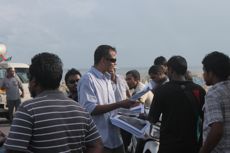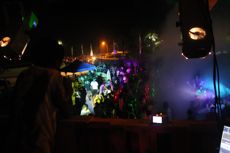Minivan News interviewed French tourist Mary Kivers, a travel agent visiting the Maldives from France. Kivers came to the Maldives interested in seeing local life, and she shared her perceptions of a country that is both a world-class vacation destination and a unique victim of climate change. Kivers was randomly chosen for the interview, and nothing was known about her or her travel plans in advance.
Eleanor Johnstone: What made you decide to come to the Maldives?
Mary Kivers: When I’m traveling I just look for the cheapest opportunity because I have a promotion as a travel agent. So I saw Male’, and I thought, “Maldives, it’s one of my dreams to go there”, especially because I am a diver, so I decided to go. But then it was pretty hard to find accommodation at a good price.
EJ: How was your trip planned?
MK: I looked on the Internet a lot, and I knew I wanted to go to a local island. I found three websites: one was rather expensive and another never called back, but the third did a package with activities including a boat trip, and full board on Guraidhoo in South Male Atoll at a great price.
EJ: What was your first impression of the Maldives?
MK: When I arrived, I thought it was really nice. First, I went to a resort because I wanted to go diving. So I spent two days and two nights in a resort. I knew I wouldn’t like it too much though, because tourists stick together and it’s a honeymoon destination, so as a girl traveling alone the resort scene can get boring. But I talked to the staff who were very friendly, even though work was hard for them during Ramazan.
I talked with some Sri Lankan staff, who said they spent seven months here and three months at home, which seems very hard for them. But otherwise, the beach was clean, the nature is perfect and the sea is really amazing. Two days, though – it was enough.
EJ: Can you tell me about the local island experience?
MK: Well, when we arrived on Guraidhoo the manager took us to see the tourist beach. There’s only one beach for tourists to wear bikinis, which is hidden away from islanders. Everywhere else, you have to be appropriately dressed for the culture.
Afterwards, every day we took boats to see inhabited islands. But it’s a pity because there’s a lot of garbage and plastic bottles, shoes, everything really, everywhere. There are no trash bins anywhere, even on the local islands. There’s a large amount of garbage, and sometimes they burn it, but it’s right near the sea. There’s the beach, then the sea, then the garbage.
EJ: Where does the garbage come from?
MK: From the people on the island. At first I thought it was all from the boats, but on my last day I really wanted to see the village and local inhabitants so I decided to go there instead of taking the tourist boat. It was really great, I was walking around and everyone was inviting me to sit with them or eat in their house.
Even though it was Ramazan, they gave me food and drinks. They were very nice, even though they don’t see many tourists. It’s funny – children speak English but the older people don’t speak English. It’s now two years since they got a ferry, so before that there wasn’t a ferry or a teacher. Now it’s getting better. In this island for example they have two schools – one for ages 2-6, and the other for ages 6-14. After 14, they have to go to Male’ or another island. The government will pay for housing on another island. But because they have many children, I think it can be hard to get everyone educated.
EJ: You’ve seen the resort side of the Maldives, the local island side, and now you’re on the capital island. How would you describe Male?
MK: Big city, lots of buildings… it’s funny because people look at you weirdly, because I think as I’m a woman alone so I stand out. But they’re very nice people. Yeah, it’s a nice city but it’s built above garbage, they put the garbage anywhere, there’s no trash, no bin. It’s funny because we who live abroad think that Male’ will be an example for the world about pollution and everything, since global warming is important here. But when you see the inhabitants in the Maldives, they put anything into the sea. It was funny, on Guraidhoo one of the girls had a diaper, you know for the baby, and I asked her where she was going. She said, “I am going to the bin,” and she went and threw it in the sea.
EJ: Really?!
MK: Yeah, I know! I even talked a little to the people about garbage, recycling, pollution, but I think it will be a long time for that change to happen. But it’s too bad, I think the sea is so nice, but when there is trash it distracts from nature and the sea.
EJ: So overall, how would you recommend the different parts of the Maldives to other travelers?
MK: Well for me, I prefer local islands for sure. Because you can really get into the culture and see how they live, and it’s more alive. Resorts are like a postcard. It’s just right, perfect…. but it’s not the real country. I guess if you like luxury and honeymoons it’s perfect, but for me it’s a little bit dead. Tourists aren’t smiling much, and I don’t like that, personally.
I would recommend people stay on a local island. I think I will do a post online about how someone can do that, because it was so hard to find a place where I could stay. So if I post on a forum and chat about where to stay in the local islands of the Maldives, maybe I can make it easier for other travelers.
EJ: What do the people you know think of the Maldives?
MK: I met a group of French people on the local island, and I think they were just happy to stay on the boat. They didn’t seem to really want to see the locals and the traditions.
EJ: Thank you, I hope you enjoy the rest of your stay, and have a safe flight home.
MK: You’re welcome.
Tourism is the biggest contributor of foreign currency to the Maldives, bringing in over 700,000 visitors each year. Some resorts, such as Soneva Fushi, appeal to the eco-minded tourist by providing environmentally conscious services. But waste remains an issue for the Maldives. In 2009, the UK’s Guardian newspaper reported that 330 tons of waste are transported to Thilafushi island for processing. Thilafushi is now commonly known as ‘garbage island’.
Likes (4)Dislikes
(4)Dislikes (0)
(0) 

